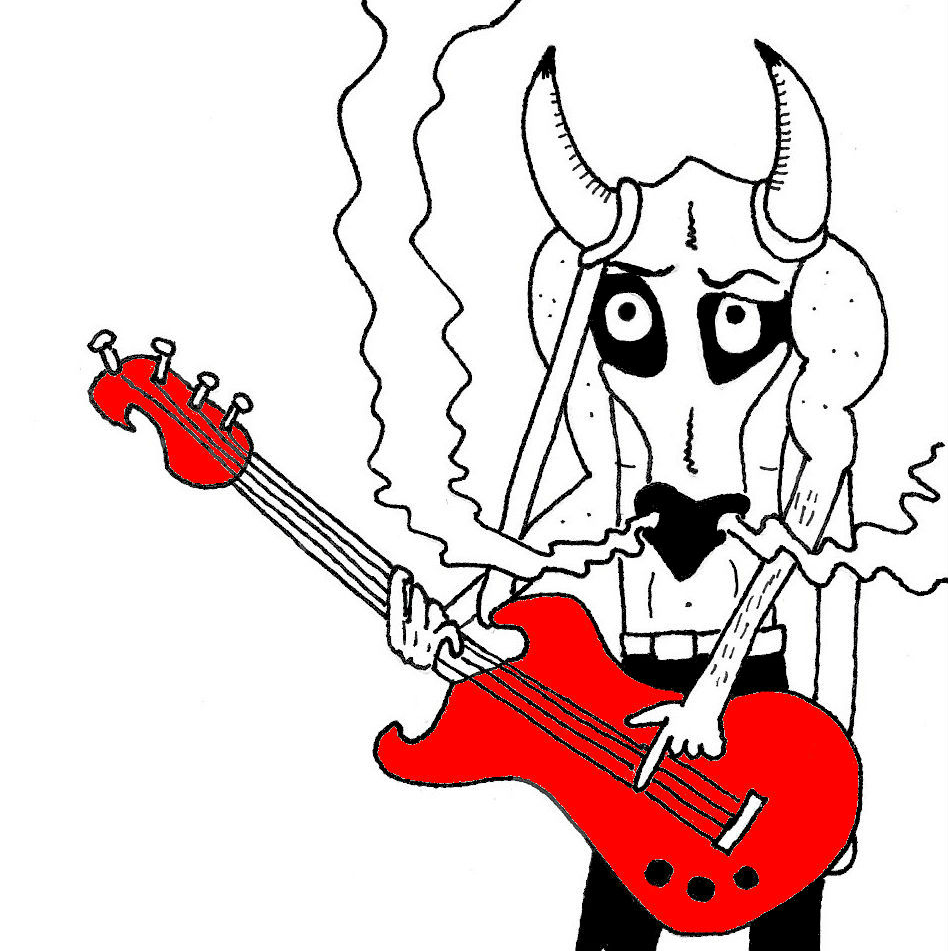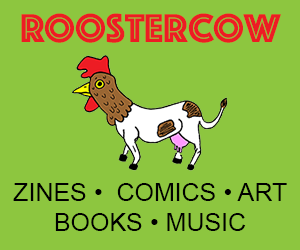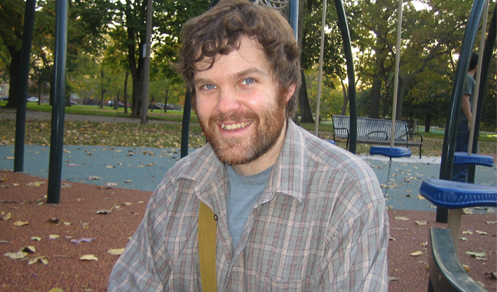
Jeffrey Brown artist interview. Published August 17, 2011
Jeffrey Brown is a very busy man. Not only is a film that he co-wrote currently in production, he’s also held the titles of music video director, NPR contributor, children’s book author, comics creator, diarist, husband, father and probably a cousin to someone somewhere as well. Mr. Brown is living proof that you can make a career out of drawing pictures of robots shooting lasers. Ok, maybe he doesn’t draw pictures of robots shooting lasers exclusively, but still, that’s pretty cool. So, if you are someone who draws pictures of robots shooting lasers, DON”T STOP NOW! — Chris Auman
Jeffrey Brown Artist Interview
When did you start drawing comics?
I think I was drawing comics when I was five or six, so pretty much from the time I could draw anything identifiable (commence jokes about that time being last year). Some of my earliest drawings had little cartoon word bubbles, and comics—both superhero and newspaper—were both things I was copying early on.
What was the first comic that you drew?
I know I drew Transformers and G.I. Joe comics amongst my first work, but there might have been some made-up superhero comics before that. The earliest story was a bunch of stick figure knights attacking a castle, but that was more of a picture book than a comic.
The Transformer cartoon series is the obvious influence for your Incredible Change-bots comics, what other stuff influenced you early on?
The Star Wars films were big for me, and J.R.R. Tolkien. In comics, the Marvel Universe was my main interest, especially X-Men. Saturday morning cartoons in general, also. Garfield was also an early influence, and I drew him enough that I can still draw him from memory, pretty much.
What do you think about the Transformer movies? Have you seen the new one?
I think they spend too much time on special effects and trying too hard to be funny. They don’t really capture the emotional connection the cartoons had for kids, but then, I guess that’s not their purpose. I think they could be a lot better, but maybe they wouldn’t make as much money. Haven’t seen the newest yet, but I will sometime, I’m sure.
Was Clumsy (later published by Top Shelf) your first self-published comic?
I had published a thing called “A Tiny Piece Of Myself” before that, which was a sixty-page collection of comics, drawings and text from my sketchbooks all jumbled together. Or, going back further, in sixth grade my friend and I made several issues of a zine called “Sci-Fi” which had comics and drawings in it.
Clumsy is very personal, autobiographical, journal-type stuff—were you nervous or apprehensive about doing that?
I wasn’t when I was writing it, because initially I hadn’t planned on publishing, and even when I first self-published I didn’t anticipate the kind of response I got. By the time Top Shelf took over publishing, I had a kind of psychological distance between what was in the books and my awareness of it. I just don’t think about it too much, or it would drive me crazy. Now, of course, I’m much more careful or considerate about what I write, though I try not to make it compromise what the stories are trying to express.
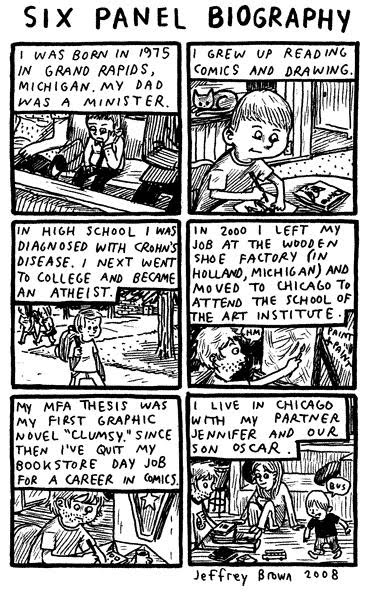
Did you get an OK from Theresa, your co-star in that book?
She had seen it while I was drawing it, and was okay with it. I think I was pretty fair and honest. I’ve never written anything intentionally hurtful or embarrassing, and I think she understood the book was less about me and her in the end, and more about a relationship.
Have you ever had any negative reactions from real-life people that you’ve portrayed in your comics?
Just a couple minor reactions that were more misunderstandings than anything. I’ve never used the comics for revenge or to try and hurt someone, it’s more that I just happen to be using my own life and real events to get at ideas about life, so I hope the people in the books all understand that. I certainly could’ve made a lot of people look a lot worse, I guess. Maybe they’re just waiting until I’m really rich and then they’ll come after me…
So, you can now add Screenwriter to your resume. Save the Date, the film that you co-wrote has just started filming, can you talk a little about the project?
It’s pretty surreal. I started working on it five years ago, when producer Jordan Horowitz asked me if I’d ever thought about writing something for film. I hadn’t seriously thought about it, but I came up with a semi-autobiographical story idea and started developing it with him, until we got to the point where I didn’t know how to make the story work for film. So Egan Reich, a playwright Jordan knew, came on and made it into a proper screenplay. It almost got made a couple years ago but fell apart at the last minute, but somehow it all came together this time. The cast is amazing. I also ended up doing a ton of artwork for it, as the lead character makes little comic drawings about her life. It’s definitely different working for film, where it’s very collaborative, compared to when I draw comics and it’s just me doing everything.
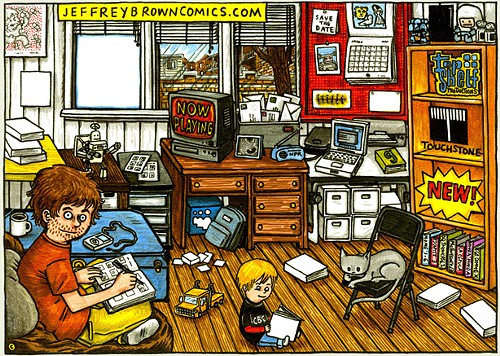
Are you going to visit the set and hobnob with the actors?
I am going to visit the set, but I’m mostly just going to try and stay out of the way. We’ll see if I make the cut to hang out with them a bit, but I’ll be happy just for a chance to observe and soak it all in. I thought about it, but I don’t think I’m going to bring my fanny pack with camera and autograph book.
And indie rock video director! How did the Death Cab for Cutie video come about. Did you hear from them out of the blue or had you been a fan or in contact with them before?
I’d been listening to them since Something About Airplanes, and a friend of mine ended up getting to know (bassist) Nick Harmer a bit. He ended up also introducing me to Aaron Stewart-Ahn, one of the other directors who’s a good friend of Nick’s, and I ended up hanging out with Aaron a bunch at San Diego Comicon one year because he’s also friends with my friends at Giant Robot. I ended up seeing Death Cab here in Chicago later that fall, and got to meet the band. When Aaron and Nick came up with the idea for Directions—where each song from the album Plans would have a video by a different director—they decided to invite a ton of artists, animators, and creative people in general whose work they liked, myself included. We each had to pick a song and write up a pitch for what our video would be, and they picked the pitch for each song they liked best. It was a pretty great experience.
That video album was nominated for a Grammy, does that mean you are a Grammy-nominated music video director?
I guess technically it does? But that’s kind of like the Eisner and Harvey Awards in comics, I’m nominated almost every year if you count anthologies I’m in those years, but it doesn’t feel right to count that. On the other hand, that’s probably my only chance to get a Grammy nomination, so I should take it.
It seems like you have a lot of irons in the fire, does that mean you are a full-time comics creator now?
I guess I’m a full-time artist, at least—in addition to the comics I’ll pick up the occasional freelance illustration job, and I’ve also started teaching a comics class at The School Of The Art Institute. Somehow I manage to cobble it all together into a career.
What’s your daily schedule or routine like, how much time are you able to devote to drawing?
It’s pretty broken up – I’ll have a few hours in the morning when Oscar’s in school or summer camp, and then can eke out a couple more during the day by giving him some alone time. I tend to stay up later four nights a week or so to get more work done. Once or twice a week we’ll also have a sitter or friend to watch Oscar, so I’ll get a longer uninterrupted day to work. I’m looking forward to next fall when he’ll be in pre-school for full days, and it should be a little easier to get into a working rhythm.
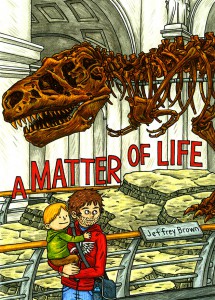
What will you be doing at the Chicago Comics-Con?
Hopefully signing a lot of books! I’ll have an assortment of mini comics that I sell only at conventions as well as some hand drawn trading cards. So hopefully it’s worthwhile for people to come see me and it’s not too boring. I’m sharing a table with Ivan Brunetti, so if there aren’t many people this year maybe we’ll just sit there and complain to each other.
Thank you Jeffrey Brown.
And thank YOU for reading Jeffrey Brown artist interview.
Read a review of Jeffrey Brown’s graphic novel A Matter of Life.
You can read more interviews with artists and other creators in the archives.
